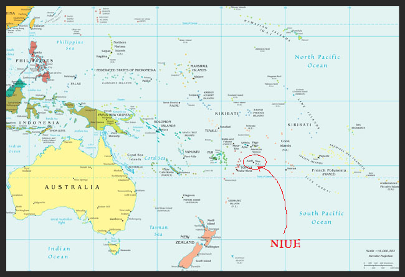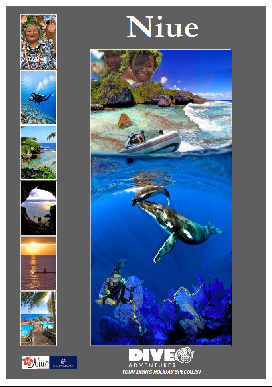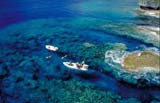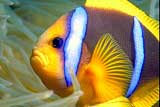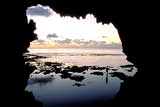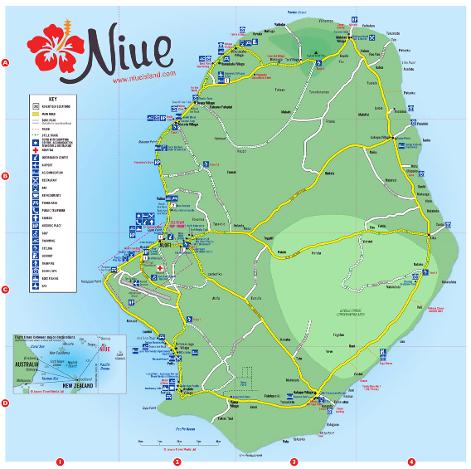
Click the map of NIUE to visit the Dive Adventures website:
Niue is one of the world's largest coral islands. This upraised coral atoll, affectionately known as "The Rock of Polynesia", is situated in the south-west Pacific Ocean, just over 3 hours north of New Zealand.
The coral makeup of the island and the surging Pacific Ocean has created a rugged coastline of soaring archways, deep chasms, cool caves, fascinating rock pools and intimate swimming coves. A fringe of coral reef clings to Niue's sides before plunging to abyssal depths.
As there are no sandy beaches, streams or rivers on Niue, the rain filters through the porous coral into the warm waters of the Pacific, completely devoid of any silt runoff. This allows the surrounding ocean to remain crystal clear with visibility often reaching 70 - 100metres - wonderful for diving.
The interior of the island is the remains of a shallow lagoon and is therefore flat with lush, tropical rainforests rich in diversity of spectacular flora and fauna, bird life and butterflies are everywhere. The entire island is laced with a myriad of magnificent limestone caves and unique geological formations. Many caves are still being formed with stalagmites and stalactites in all stages of development. The bush tracks through the forests are not clearly signposted so it is essential to explore harder to find caves with a local tour guide who will provide an insight into their history.
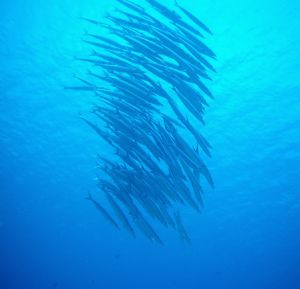
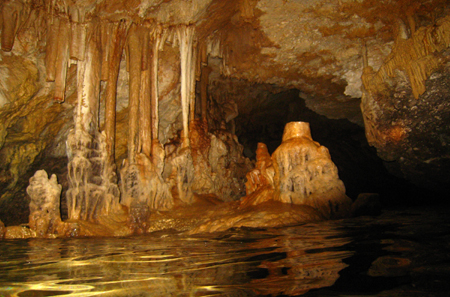
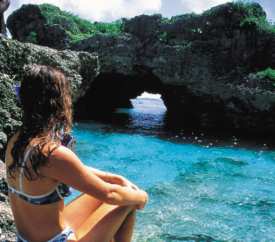
THE PEOPLE AND THEIR CULTURE:
Niue remains a traditional Polynesian society. The population of almost 1200 people are mostly based in and around the capital of Alofi. The Niueans enjoy dual citizenship as an independent nation, in free association with New Zealand. The locals are well educated and bilingual in Niuean and English and take pride in their many traditions and cultures that have been handed down from generation to generation. Niuean women are highly respected for their craft of quality weaving. Individually woven hats, mats, baskets and other crafts can be purchased from the women on market days. Sundays are considered a day of rest and worship and visitors are asked to consider protocols in place.
Niue is a unique, unspoiled island destination. It is laid back, quiet and peaceful, an island for the explorer and adventurer and for those who want to relax in an un-commercialized environment among friendly people.
SCUBA DIVING IN NIUE
Niue’s isolated location, lack of rivers and porous makeup, provides stunning clarity with water visibility of no less than 40 metres up to 100 metres!!. Great for underwater photography. Explore drop-offs, canyons and caves.
The reef, predominately made up of hard coral, drops to around 40 metres, where it levels off for a short distance before heading off into the vastness of the abyss. There are numerous dive sites, some quite challenging.
Snake Gully has an abundance of timid sea snakes measuring up to a metre long. They ascend to the surface for a gulp of air before returning to probe the crevices of the reef for food. Along with the usual reef dwellers you will encounter reef sharks, barracuda, Maori wrasse, the comical anemone, surgeonfish, Moorish idol, regal angelfish, long nosed butterfish, large fin banner fish, the crown of thorns starfish and the elusive aqua Ribbon eel.
Spinner dolphins are in attendance all year. Every year, between June and October the migrating Humpback Whales are a common sight frolicking around and breaching close to shore.
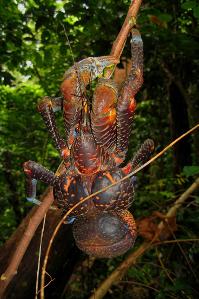
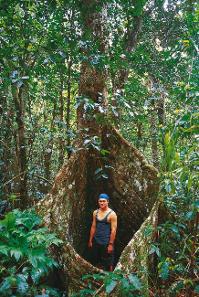
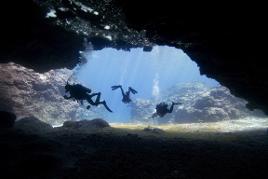
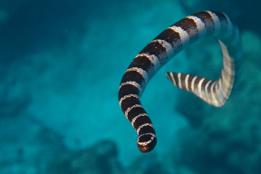
"SNAKE GULLY"
Snake Gully has an abundance of timid sea snakes measuring up to a metre long. They ascend to the surface for a gulp of air before returning to probe the crevices of the reef for food. Along with the usual reef dwellers you will encounter reef sharks, barracuda, Maori wrasse, the comical anemone, surgeonfish, Moorish idol, regal angelfish, long nosed butterfish, large fin banner fish, the crown of thorns starfish and the elusive aqua Ribbon eel.
Spinner dolphins are in attendance all year. Every year, between June and November the migrating Humpback Whales are a common sight frolicking around and breaching close to shore.
"THE CHIMNEY"
Enter a hole five metres below the surface and drop down vertically through the 'chimney' reaching “the fireplace " at twenty seven metres. As you descend, the bubbles from the divers below drift pass, giving the feeling you are in space. Look up and you have a silhouette of the following divers. At the base you are in an arch from which you look out into the deep blue waters. The fireplace is a favourite haunt for crayfish.
“LIMU TWIN CAVES”
This dive site is one of the further sites from the dive shop. However it is definitely worth the trip.The dive is based around two large caverns in the reef flat dropping down from a shallow 6m down to 28m. As you make your way through the caverns you can encounter Nudibranchs, Juvenile Scorpionfish, friendly Sea Kraits, Spotted Rock Cod and on occasions a Black Tip Reef Shark or a Napoleon Wrasse. This is a great dive for those that enjoy caverns and swim throughs but also has a variety of marine life both large and small.
Snorkelling
There are several stunning in shore swimming areas and coral pools like Matapa Chasm and Limu that offer a gentle introduction to the marine world beyond the outer reef.
The clear shallow waters with temperatures between 25 – 28°C, teem with colourful fish and living coral. You can snorkel around the rock pools, some formerly reserved exclusively for Niuean kings, for hours without growing tired or cold.
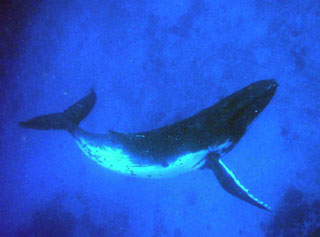
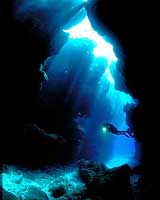
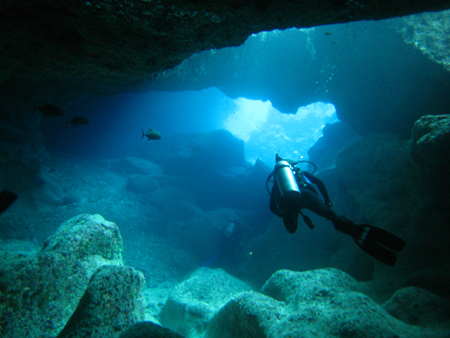
Caving
Niue is laced with caves ranging in size from wormholes to giant caverns. These systems formed the basis of ancient Niuean homes, food storage and burial places.
Guided cave tours and expeditions are graded from easy to challenging dependent on visitors needs and abilities. The guide has extensive knowledge of the history and legends of the caves.
Fishing
Niue is legendary amongst in-the-know fishermen. The steep drop off to the abyss on the edge of the Pacific Plate provides fishing just metres off shore. Large predatory fish use Niue as a marker and stopover point. Big game and sport fishing are excellent.
The main species targeted are Wahoo, Mahimahi and Yellowfin Tuna with Marlin also being taken. Boats are lowered by crane and trolling begins within metres of the wharf with no time taken up with getting to fishing spots. Saltwater fly-fishing can also be tried with lines cast close to the reef from off shore.
Forest Walks
A magical 3 hour tour exploring the depths of Niue's marvellous rainforest is a must. As walking tracks are scarce a guided tour with a botanical expert is a good idea and will enhance your senses and knowledge of the ancient forest.
Mountain Biking
The mainly flat terrain and lack of traffic makes biking a relaxing and fun pastime. Ride the sealed roads to one of the many coral pools around the coast or go off road on trails through taro fields and tropical rainforests. Good quality and well maintained bikes can be hired from rental companies.
Niue Golf and Sport Club
A 9 hole golf course and 2 tennis courts are available. The course is a little underdeveloped but the clubhouse is well stocked and friendly. Clubs and rackets can be hired at reasonable rates.
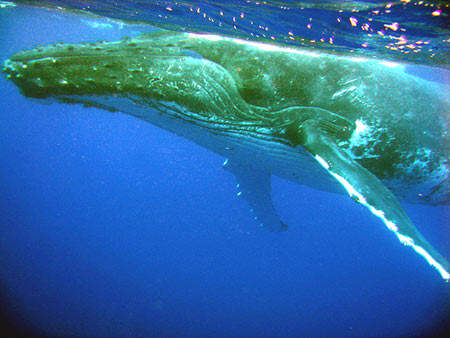
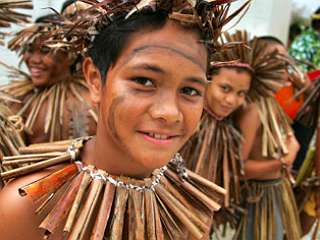
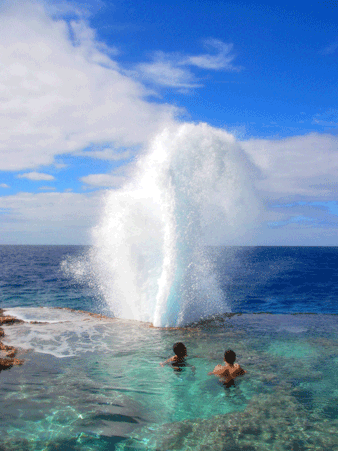


Time Zone: UTC+12 (2 hours ahead of Australian Eastern Standard Time)
Languages: Niuean (a Polynesian language closely related to Tongan and Samoan); English
Currency: Niue uses the New Zealand dollar ($NZ). There is a bank in Alofi (Bank of South Pacific). Only a few shops accept credit cards so be sure to have cash available.
Electricity: 240 volts, 10 amp, 3 pin plug, same as New Zealand & Australia.
Climate: At 19 degrees South of the equator, tropical Niue is never cold and has only two seasons: Wet (from December to March) and Dry (from April to November). It has an average annual temperature of 25 degrees Celsius and a moderate humidity that peaks at 88%. Average rainfall is 218 cm per annum, and it rains about 170 days per year.
Eating & Drinking: The larger accommodation properties offer restaurant dining with an international menu, local flavour buffet nights with live music and regular theme nights. Basic groceries and beverages can be purchased in Alofi, Monday to Friday.
Getting Around: There is no public transport, but rental companies hire out mountain bikes, motorbikes, cars and vans. A local driver's licence must be obtained from the police station upon presentation of your current driver's licence. Taxis can take you on shorter trips'
Drinking Water: Niue's main water supply is artesian, extracted through bores. It is recommended that visitors do not drink the local water unless boiled. Bottled water is highly recommended and is readily available.
Health: For medical requirements Niue hospital offers 24 hour on call services. Unless the visitor is arriving from an infected area, no vaccinations are required.
Departure Tax: International Departure tax is NZ$20.00 per person, children under 12yrs are exempt.
Customs & Dress: Sunday is a day of rest on Niue with local people attending church. Visitors are asked to use discretion while visiting Niue when taking part in activities on a Sunday, bearing in mind the Sunday Observance. Fishing and boating are prohibited on Sundays. Wearing swimwear without a sarong or paleu (sulu) in Niue is frowned upon. Tipping is not encouraged.


